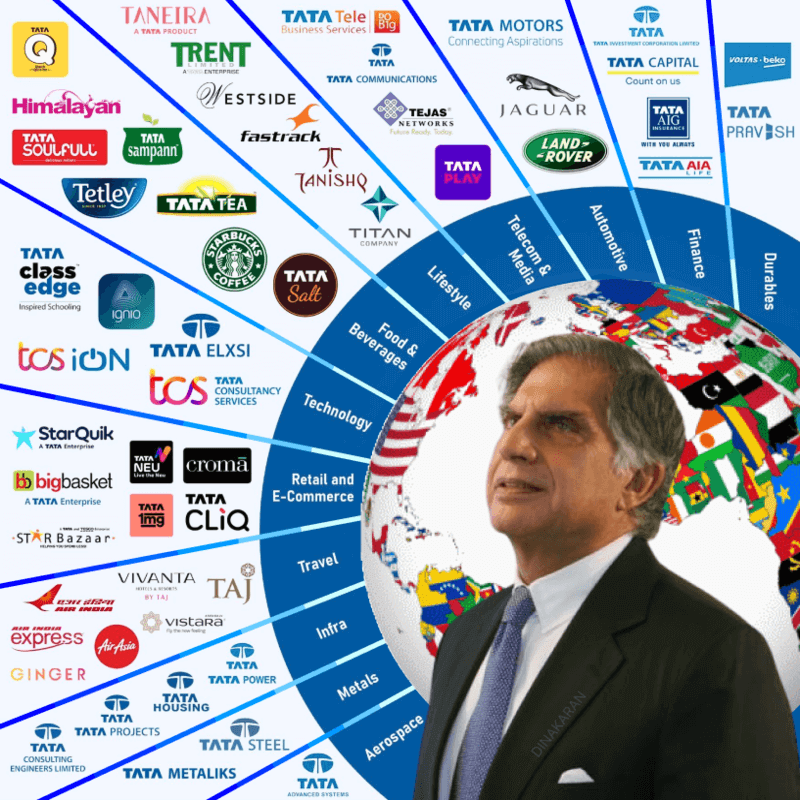
Ratan Tata, the chairman emeritus of Tata Sons, passed away recently. He was widely admired for his stewardship of one of the country’s largest conglomerates, his personal ethics, and his philanthropic activities. Read here to learn more about his visionary life.
Ratan Tata was part of the illustrious Tata family, a pioneering industrial and philanthropic dynasty in India.
His great-grandfather Jamsetji Tata founded the Tata Group in 1868, laying the groundwork for the nation’s industrial revolution.
Jamsetji Tata is credited with building key industries that played a major role in India’s self-sufficiency post-independence, especially with the establishment of Tata Steel in 1907, India’s first steel plant.
The Tata Group’s contributions to Indian society expanded under J.R.D. Tata, Ratan Tata’s uncle, built major subsidiaries including Tata Motors (India’s largest automotive manufacturer), Tata Consultancy Services (TCS) (a leading global IT services company), and Tata Salt, which became India’s first iodized salt brand.
Life of Ratan Tata
Ratan Tata, born on December 28, 1937, is one of India’s most prominent and respected industrialists.
- After attending various schools in Bombay, Tata finished high school in New York City in 1955.
- He then progressed to Cornell University, Ithaca, New York, where he earned a B.S. (1962) in architecture before returning to India to work.
- He acquired his business training on the job, gaining experience in several Tata Group businesses, and was named director in charge (1971) of one of them, the National Radio and Electronics Co.
- He became chairman of Tata Industries a decade later, and in 1991 he succeeded his uncle, J.R.D. Tata, as chairman of Tata Sons, the parent company of the Tata Group.
His leadership helped transform Tata Group into a global powerhouse, extending its footprint across numerous sectors including steel, automotive, telecommunications, IT, and hospitality.
Beyond business, Ratan Tata is celebrated for his philanthropic endeavours, social consciousness, and vision for nation-building.
Visionary Leadership at Tata Group

Under Ratan Tata’s leadership, the Tata Group experienced unprecedented growth. He initiated significant reforms to streamline the conglomerate’s operations, modernizing many of its key businesses and steering them into competitive global markets.
One of his landmark achievements was the acquisition of international companies like Tetley (UK), Corus (UK), and the luxury car brands Jaguar and Land Rover (UK), which cemented Tata Group’s global presence.
He was also the driving force behind the launch of the Tata Nano, an ambitious project aimed at producing the world’s most affordable car, demonstrating his commitment to providing accessible products for the Indian middle class.
- The Singur controversy: The manufacturing of Tata Nano was involved in a controversy over the acquisition of land in Singur, West Bengal, for the proposed factory. The sale of the land was facilitated by the state government but prompted fierce protests by displaced farmers and political leaders of opposition parties. The site of the production plant was eventually moved to Sanand, Gujarat.
The Cyrus Mistry controversy: The removal of Cyrus Mistry from his position as chairman of Tata Sons in 2016, led to one of the most high-profile corporate battles in Indian history.
- Cyrus Mistry belonged to the Shapoorji Pallonji (SP) Group, the largest minority shareholder in Tata Sons, holding an 18.4% stake. The Mistry family had a decades-long relationship with Tata Sons, and Cyrus Mistry’s appointment in 2012 was seen as a continuation of this close association. However, his ousting led to major legal and corporate disputes between the two parties.
In 2021 the Tata Group won the bid to take over Air India, an airline that was originally owned by the conglomerate and subsequently nationalized in 1953.
- Even though the event was after Ratan Tata retired as chairman, it was an evocative moment for him.
Commitment to Innovation and Sustainability
Ratan Tata’s forward-thinking vision also extended to promoting innovation and sustainability.
He actively invested in technologies aimed at improving the quality of life, from cleaner energy initiatives to social impact investments.
Tata Group was among the first Indian companies to invest heavily in research and development during his tenure.
The Tata Center for Technology and Design at the Massachusetts Institute of Technology works on providing solutions to challenges faced by communities that have limited access to electricity, low income, and poor literacy.
Philanthropy and Nation-Building
Ratan Tata’s philanthropic work is carried out mainly through the Tata Trusts, which control a significant portion of Tata Sons, the holding company of Tata Group.
The Trusts work in areas such as education, healthcare, and rural development, contributing significantly to India’s social upliftment.
His contributions to education include establishing numerous scholarships, supporting institutions like Harvard Business School, and improving healthcare facilities across rural India.
In 2020, during the COVID-19 pandemic, Tata committed significant funds to aid relief efforts, further solidifying his image as a compassionate and visionary leader who prioritizes the welfare of society.
Tata’s compassion for animals went beyond personal efforts. He actively supported those working to improve the lives of animals.
- In July 2023, after years of planning and delays, Tata opened India’s first Small Animal Hospital in Mahalaxmi, Mumbai. The state-of-the-art facility, spread across 98,000 square feet, includes cutting-edge technology such as ICUs, HDUs, CT scans, MRI, X-rays, and ultrasound machines. It offers specialized treatments in dermatology, dental care, ophthalmology, and other areas.
Awards and Recognition
Ratan Tata has received numerous accolades throughout his career, including the Padma Vibhushan, India’s second-highest civilian award, and the Padma Bhushan, for his contributions to trade and industry.
Globally, he is recognized as one of the most influential business leaders, admired for his integrity, humility, and commitment to ethical business practices.
Legacy and Influence
Even after his retirement, Ratan Tata remains a highly influential figure in business, startups, and philanthropy.
His continued involvement in mentoring young entrepreneurs through investments in startups reflects his enduring commitment to innovation.
His emphasis on ethical business practices and sustainable growth has had a lasting impact not just on Tata Group, but on India’s corporate landscape as a whole.
Ratan Tata’s vision, leadership, and philanthropy have made him a symbol of industrial excellence and social responsibility, and his legacy continues to inspire both business leaders and social reformers in India and abroad.
-Article by Swathi Satish






Leave a Reply